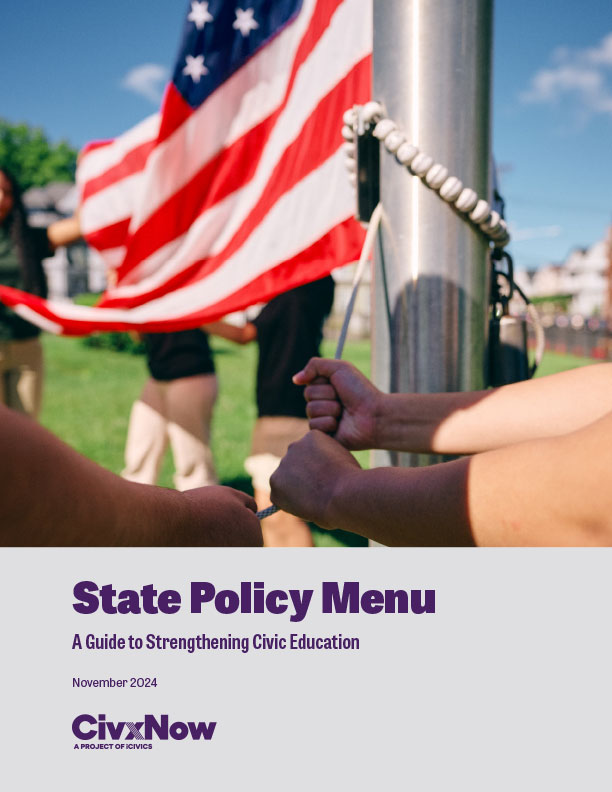State Policy Menu
A Guide to Strengthening Civic Education
This guide is your one-stop shop for crafting strong civic education policies for K–12 schools. We understand you’re busy, so we’ve made it easy to navigate.
Actionable Recommendations: No fluff, just clear policy options tackling various aspects of civic education. Each page outlines the challenge, followed by a plain-language recommendation and multiple policy options.
Resources at Your Fingertips: Need model bill language or examples from other states? Each one-pager has links to those as well. Plus, we’ve included references to supporting research and specific real-life state examples.
One-pagers by Topic: Each section is concise and easy to digest, perfect for you and your staff.
- Strengthen Civics Course Requirements
- Strengthen Funding for Civic Education
- Strengthen Professional Development and Preservice Training for Civic Education
- Align State Standards with Consensus and Best Practice
- Encourage and Acknowledge Student Excellence and Participation in Civics
- 21st-century Civic Education Priority: Information Literacy
- Build In Assessment and Accountability
Use the Entire Guide or Focus on Specific Areas: This guide empowers you to take a comprehensive approach to strengthening civic education or focus on specific areas you find most pressing. This menu-style approach allows you to choose the recommendations that best fit your state’s priorities. Want to create new funding for civic educator professional development? We’ve got you covered. Looking to implement better civic assessments or establish a civic seal? We have recommendations for that, too.
Beyond Legislators: Recognizing the many key players in education policy, this guide includes dedicated sections for governors, secretaries of state, and America250 commissions who are uniquely positioned to influence policy.
Get the Status of K–12 Civic Education in Your State
Before delving into specific policy recommendations, we invite you to gain valuable insights from our website’s comprehensive state profiles on K–12 civic education. Each profile details what currently exists and potential areas for improvement. State profiles are updated annually at the end of every summer and maintained throughout the year.
Civics is a Winning Issue
The 51st annual Phi Delta Kappa poll of public attitudes on education (2019) — as well as findings from The Democracy Project report(2018), an iCivics/More Perfect poll conducted by Cygnal (2022), and more — all tell us that an overwhelming majority of Americans want more civics taught. This high level of support remains true across all age, gender, racial, political, socioeconomic, and geographic demographics. To that end, you will find throughout this document examples of policies to advance civic education that have garnered bipartisan support.
Getting Support
For one-to-one support and/or technical assistance, please contact our state policy staff.
State Policy Menu Working Group
Ashley Bland Manlove
State Representative
Missouri
Stephen Masyada
Director
Lou Frey Institute at the University of Central Florida
Nan Eileen Mead
Director of Outreach & Communication
DemocracyReady NY
Carly Muetterties
Civic Educator
Kentucky Civic Education Coalition
Arienne Orozco
Director of Outreach & Engagement
Office of the Connecticut Secretary of State
Andrew Wilkes
Chief Policy & Advocacy Officer
Generation Citizen
Kyle Zawacki
Legislative Director
Michigan House of Representatives
STAFF
Lisa Boudreau
Director of State Policy
iCivics
Diana Leo
State Policy Lead
iCivics
Tanisha Pruitt, Ph.D.
State Policy Lead
iCivics

